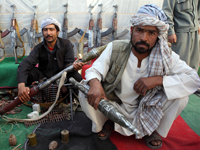Registration
You will receive an email confirming your registration.
IMGXYZ2387IMGZYXThe recent London Conference on Afghanistan in January 2010, with its focus on a phased transition to Afghan security and conditional reintegration of former Taliban members, has once again revived debate on, and prospects of, negotiations and reconciliation with the Taliban. Optimistic assessments of the Marjah operations and Pakistani cooperation against the Afghan Taliban as well as pessimistic evaluations of the course of counter-insurgency operations and the Afghan state have both been used in favor of talking to the Taliban. The Obama administration has yet to declare its formal position on the matter. Top administration officials themselves have either been guarded or have ruled out reconciliation with top Taliban leadership.
In light of this renewed debate, Carnegie’s Gautam Mukhopadhaya and Jasmeet Ahuja, Professional Staff Member for the House Committee on Foreign Affairs, discussed the implications of negotiating with the Taliban.
